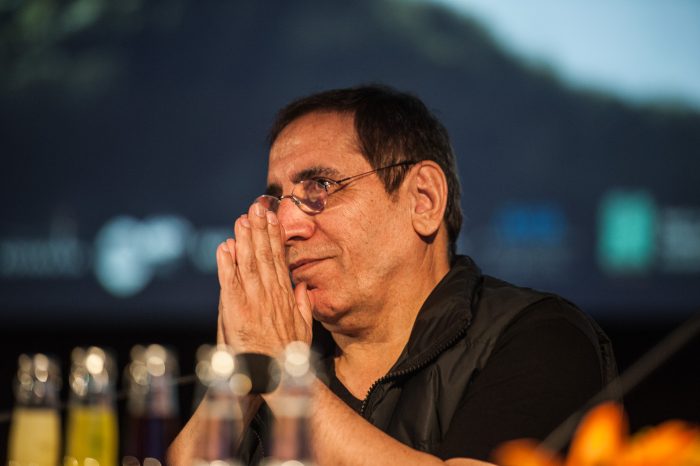The legendary director Mohsen Makhmalbaf shared his long and well-thought-out visions about the philosophy of filmmaking and the situation in his native country Iran. Mohsen Makhmalbaf, the father of Samira Makhmalbaf, a guest in Sodankylä 10 years ago, was interviewed by festival’s artistic director Timo Malmi.
Makhmalbaf says that growing up he never saw movies. His upbringing was conservative and having an interest in arts was disapproved. At the age of 8 he dropped out of school to support his family struggling to make ends meet.
Makhmalbaf found the world of literature after being incarcerated at the age of 17. He was convicted for taking part in a revolutionary movement against the Shah of Iran. He spent his time in prison reading a book after another and started to question whether the world could ever be changed through violence or politics. This realisation grew stronger after he was released from prison.
Makhalbaf remembers seeing François Truffaut’s dystopian film Fahrenheit 451 (1966) in his 20s and realizing that it is possible to both connect and communicate with people through cinema.
As well as being a writer, Makhmalbaf tested his skills in movie making. He explains that as a filmmaker he is self-taught. According to Makhmalbaf, quality filmmaking requires the director to have a broad general knowledge and personal vision, capability to tell a story entertainingly as well as talent to construct a magical tension to the film. These are some of the things he has taught his students at Makhmalbaf Film House, a film school and a movie production establishment he founded in 1996.
Makhmalbaf has repeteadly faced difficulties during his career. Because of Iran’s strict censorship, only a small part of all the productions are allowed to be seen by the public. The strict circumstances force the filmmakers to be creative, for example by sending scripts of false movies to the authorities, or smuggling films that are in danger of being censored abroad.
Makhmalbaf escaped from Iran in the 2000s with his family. He admits that the revolution has failed and that he still suffers from political persecution.
Makhmalbaf wants to make a change to the everyday problems in the society with his work. He puts the blame for the current situation on his countrymen along with dictators and leaders. Obsolete perceptions must change or there will never be a turn for the better. He thinks the problem is universal. Makhmalbaf believes nevertheless that knowledge can be expanded through cinema.
If Makhmalbaf were to choose a film to take to a desert island, his choice would be Satyajit Ray’s Pather Panchali (1955).
